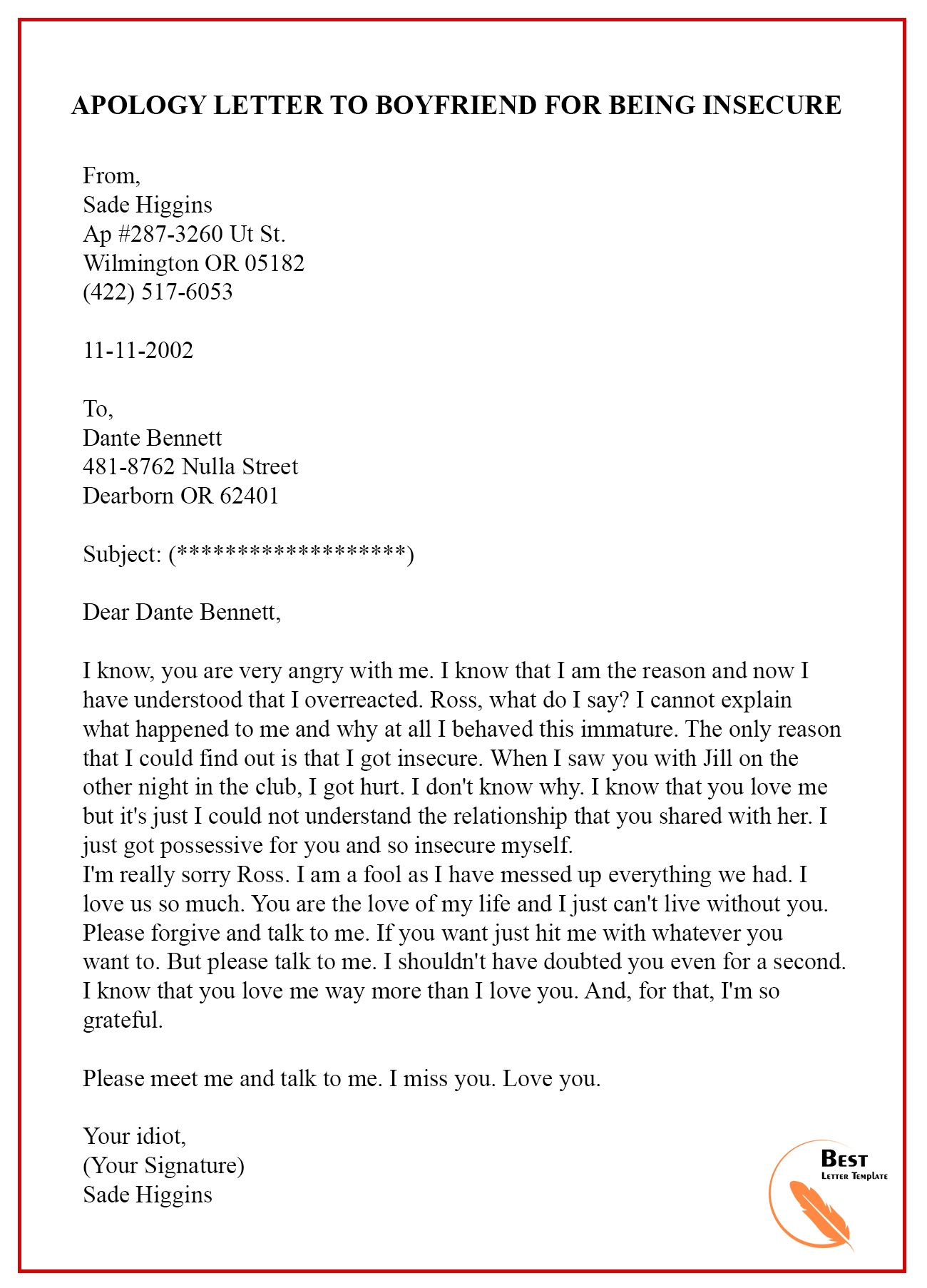Ever found yourself in that awkward moment where you messed up with your boyfriend? Yeah, we've all been there. Whether it's a small misunderstanding or a major blowout, apologizing to your BF is no joke. But don't sweat it—this guide will walk you through every step of crafting the perfect apology for bf. Because let's face it, relationships are about more than just love; they're about respect, communication, and yes, even those tough conversations.
Picture this: you're scrolling through your phone, and suddenly you remember that thing you did—or maybe didn't do—that ticked him off. Panic sets in. But hold up! Before you spiral into anxiety mode, take a deep breath. Apologizing isn't just about saying "I'm sorry." It's about showing him that you care enough to make things right. And hey, who doesn't want a relationship built on mutual respect, right?
Look, no one's perfect. Even the most epic couples have their fair share of hiccups. The key is how you handle those moments. Whether it's forgetting his birthday, ghosting him for a day (oops), or something more serious, learning how to apologize effectively can save your relationship and strengthen your bond. So, let's dive in and figure out how to ace that apology for bf!
Read also:Carter Hudson Birthday A Deep Dive Into The Life And Celebration Of A Rising Star
Understanding the Importance of a Genuine Apology for BF
Let's get real here. A half-hearted "sorry" isn't gonna cut it. When you're apologizing to your boyfriend, it's not just about mending fences; it's about rebuilding trust. Trust is the foundation of any healthy relationship, and when it's broken, it takes effort to fix it. But don't worry—this isn't rocket science. It's all about sincerity, empathy, and a willingness to change.
Think about it this way: if you've ever been on the receiving end of a lousy apology, you know how it feels. It's like, "Did they even mean it?" That's why putting in the effort to make your apology genuine is crucial. Your bf deserves to know that you understand where he's coming from and that you're willing to do better. And trust me, he'll appreciate it more than you think.
Why Saying Sorry Matters in Relationships
So, why does apologizing matter so much in relationships? Well, for starters, it shows that you respect him enough to acknowledge when you're wrong. It's not about admitting defeat; it's about showing maturity and emotional intelligence. In a world where egos can run wild, being able to say "I'm sorry" is a powerful move.
Plus, apologizing doesn't just benefit him—it benefits you too. It clears the air, reduces tension, and opens the door for better communication. And let's be honest, who doesn't want a drama-free relationship? By taking responsibility for your actions, you're setting the tone for a healthier dynamic. Now, doesn't that sound like a win-win?
Common Mistakes to Avoid When Apologizing to Your BF
Alright, let's talk about the elephant in the room. We've all made mistakes when it comes to apologizing, and that's okay. The key is learning from them. One of the biggest blunders people make is trying to justify their actions while apologizing. You know what I'm talking about: "I'm sorry, but..." Yeah, don't do that. It's like saying sorry with an asterisk, and trust me, it doesn't fly.
Another common mistake is rushing the apology. Sometimes, people think that throwing out a quick "sorry" will magically fix everything. Spoiler alert: it won't. Your bf deserves time to process his feelings, and so do you. Take a moment to reflect on what went wrong and why it mattered. A well-thought-out apology is always better than a rushed one.
Read also:Meet The Man Behind The Scenes David Muirs Husband
Things to Avoid When Saying Sorry
- Don't use "but" to justify your actions.
- Avoid making excuses or shifting the blame.
- Don't rush the apology—timing matters.
- Steer clear of generic apologies that lack detail.
- Never dismiss his feelings by saying things like "You're overreacting."
These little pitfalls might seem small, but they can make or break your apology. Remember, the goal is to show him that you get it—and that you care.
Steps to Craft the Perfect Apology for BF
Now that we've covered the basics, let's dive into the nitty-gritty of crafting the perfect apology. Think of it like baking a cake: you need the right ingredients and the right steps to get it just right. Here's a step-by-step guide to help you ace that apology:
Step 1: Acknowledge the Issue
The first step in any apology is acknowledging what went wrong. Don't sugarcoat it or downplay the situation. Be honest about your role in the conflict. For example, instead of saying, "I guess I kinda messed up," try something like, "I know I hurt you when I [insert action here]." Specificity is key here.
Step 2: Take Responsibility
This is where you own up to your actions. No excuses, no justification—just pure accountability. Say something like, "I take full responsibility for what happened." It shows him that you're not shying away from the issue and that you're serious about making things right.
Step 3: Express Empathy
Empathy is the glue that holds relationships together. Show him that you understand how he feels. You can say something like, "I can only imagine how disappointed and hurt you must feel." This step is crucial because it validates his emotions and shows that you're not just apologizing for the sake of it.
Step 4: Offer a Solution
An apology isn't complete without a plan to prevent the same mistake from happening again. Whether it's committing to better communication, setting boundaries, or simply being more mindful, let him know that you're willing to change. For example, "Going forward, I'll make sure to check in with you more often so we can avoid misunderstandings." Boom—problem-solving at its finest.
Timing is Everything: When to Apologize to Your BF
Timing can make or break an apology. Apologizing too soon might come off as insincere, while waiting too long can make things worse. So, when's the right time to say sorry? Here's the deal: wait until both of you have had a chance to cool off. Emotions can run high during conflicts, and trying to apologize when tempers are flaring isn't going to help anyone.
A good rule of thumb is to wait until the dust has settled, but not so long that it feels like you're avoiding the issue. A day or two is usually a safe bet, but it depends on the severity of the situation. Trust your gut here—just make sure you're approaching the conversation with an open heart and a clear mind.
Signs It's Time to Apologize
- He seems more calm and receptive to conversation.
- You've had time to reflect on your actions.
- You genuinely feel remorseful and ready to make amends.
Remember, the goal is to create a space where both of you can talk openly and honestly. Rushing the apology can backfire, so patience is key.
Verbal vs. Written Apologies: Which Works Best?
Now, here's a question that often comes up: should you apologize in person, over the phone, or through a heartfelt message? The answer depends on the situation and your bf's preferences. Some people prefer face-to-face conversations because they feel more personal, while others might appreciate a written apology for its thoughtfulness.
If you choose to apologize in person, make sure you're in a quiet, distraction-free environment. This shows that you're giving the conversation the attention it deserves. On the other hand, a written apology—whether it's a text, email, or handwritten note—can give you time to express your thoughts clearly and thoughtfully. Plus, it's something he can revisit later, which can be comforting.
Pros and Cons of Each Approach
- Verbal Apology: Pros—More personal and immediate. Cons—Can be more emotionally charged.
- Written Apology: Pros—Allows for clarity and reflection. Cons—May lack the emotional connection of a face-to-face conversation.
Ultimately, the best approach is the one that feels right for both of you. Just make sure you're putting in the effort to make it meaningful.
Dealing with Emotional Baggage: Beyond the Apology
Let's face it: sometimes, apologizing isn't enough. If there's a lot of emotional baggage involved, it might take time to fully repair the relationship. That's okay. Healing isn't always instantaneous, and that's something you both need to accept. What matters is that you're both willing to work through it together.
One way to address emotional baggage is by setting boundaries and expectations moving forward. Maybe it's agreeing to check in with each other regularly or committing to more open communication. Whatever it is, make sure it's something you both agree on. Relationships are a two-way street, after all.
Building Trust After an Apology
- Be consistent in your actions moving forward.
- Communicate openly and honestly about your feelings.
- Give him time and space to process everything.
- Reaffirm your commitment to the relationship.
Trust takes time to rebuild, but with patience and effort, it's definitely possible.
Real-Life Examples: How Others Have Nailed Their Apologies
Let's take a look at some real-life examples of people who've aced their apologies. These stories aren't just inspiring—they're also practical. They show that even the toughest situations can be turned around with the right approach.
For instance, there's the story of Sarah and Jake, who had a major fallout over a misunderstanding. Sarah took the time to reflect on what went wrong, wrote Jake a heartfelt letter, and followed up with a face-to-face conversation. The result? They not only resolved their issues but also strengthened their bond.
Or take the case of Mark and Lisa, who had a long-standing issue with communication. Mark decided to take a proactive approach by attending couples counseling and working on his listening skills. Over time, their relationship improved dramatically, all because Mark was willing to put in the effort.
Lessons Learned from These Stories
- Reflection is key to understanding the root of the problem.
- Putting in consistent effort shows genuine commitment.
- Open communication is essential for long-term success.
These examples prove that with the right mindset and approach, anything is possible.
Conclusion: Apologizing with Heart and Soul
Let's wrap this up, shall we? Apologizing to your bf isn't just about saying "I'm sorry"—it's about showing him that you care enough to make things right. By following the steps we've outlined, you can craft an apology that's sincere, thoughtful, and effective. Remember, relationships are about more than just love; they're about respect, trust, and communication.
So, whether you're apologizing for a small slip-up or a major mistake, approach it with an open heart and a willingness to learn. And hey, don't forget to give yourself credit for taking the first step. Apologizing isn't easy, but it's one of the most powerful things you can do for your relationship.
Now, it's your turn. Take a deep breath, reflect on what went wrong, and craft that apology with all the love and sincerity you've got. And when you're done, don't forget to share your success story with us in the comments below. Who knows? You might just inspire someone else to take that first step too!
Table of Contents
- Understanding the Importance of a Genuine Apology for BF
- Common Mistakes to Avoid When Apologizing to Your BF
- Steps to Craft the Perfect Apology for BF
- Timing is Everything: When to Apologize to Your BF
- Verbal vs. Written Apologies: Which Works Best?
- Dealing with Emotional Baggage: Beyond the Apology
- Real-Life Examples: How Others Have Nailed Their Apologies
- Conclusion: Apologizing with Heart and Soul


